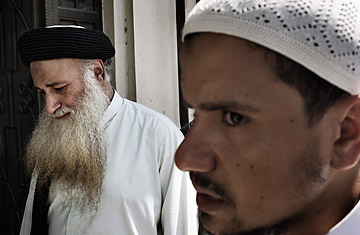
Mohamed Abdel Rahim al-Sharkawy spent 17 years behind bars in Egypt after being extradited from Pakistan in 1994. The fundamentalist Islamist was released from prison in March after numerous appeals from his family claiming his innocence.
(3 of 5)
Egyptian prison authorities had a reputation for encouraging — and also coercing — Islamist prisoners to sign confessions and pledges of non-violence in order to facilitate their release. Sharkawy always refused. "Police officers would visit him in prison and ask him to sign a document saying that he repents," says Bahgat, whose organization represents Sharkawy. "He always refused to sign that document because he has done nothing wrong — but also because he wanted an apology. We believe that this contributed to his prolonged unlawful detention."
The Egyptian Initiative for Personal Rights and other rights groups lobbied on Sharkawy's behalf. But with each appeal, his captors would grow more aggravated. The court issued more than 17 release orders over 17 years, says Sharkawy's son Abdel Rahman. None of them were heeded. "It became personal enmity," he says. "Because my father sticks to his rights. And they like people who they can smash."
Like Father, Like Son
Sharkawy's eldest son Abdel Rahman had already been forced by circumstances to replicate his father's experience with the authorities. The family had resisted leaving Pakistan after Sharkawy's rendition, fearing that a similar fate would greet them if they returned to Egypt. Instead, they called Sharkawy's parents and brothers regularly to check on his status. Abdel Rahman helped his mother run the electronics store that her husband had left behind. He and his siblings continued their studies.
But after 9/11, everything changed. A large group of Arabs had settled in Pakistan, but the jihad against the Soviets was long over. And Abdel Rahman says Arab Pakistanis soon found themselves caught in the new U.S.-backed hunt for Osama Bin Laden and al-Qaeda. "The Americans and ISI weren't differentiating between those [Arabs] who came from Afghanistan and those who were settled in Pakistan," he says. "Further, the Pakistanis used it like a business — selling Arabs to the United States. Not real suspected Arabs, but normal people, to the United States to get money from them; to show that they were fighting terrorism." The family saw friends rounded up. "Out of nowhere, they were arrested and landed in Guantanamo, and they were involved in nothing."
Sensing the danger, the family rented out their property in Peshawar and moved to Attock, a small military garrison town halfway between Peshawar and Pakistan's capital of Islamabad. Every month, Abdel Rahman returned by bus to collect the rent. "Of course I was calling my grandmother and grandfather in Egypt every week to know my father's situation," Abdel Rahman says. And he thinks that made the unfortunate difference in 2004. "The Americans by that time were doing heavy surveillance on the telephones, especially of those contacting the Arab world. I went to pick up the rent, and on my way back, at the bus station, I found two guys getting inside the bus with an instrument beeping. When they got close to me, the beeping got louder. They were tracking my telephone."
Abdel Rahman was 23-years-old when he was cuffed, beaten and taken to ISI headquarters in Peshawar. There, he faced a series of interrogations by American voices. "They had a Lebanese translator, but he was using bad language, so I started answering in English," says Abdel Rahman, who is fluent in five languages. "They were silly questions like 'Have you been to Malaysia? Have you been to the U.K.? Do you know Abu something?' — strange names I've never heard of. 'What are you doing here all this time?' I told them I just grew up here. And then they started threatening me: if you don't tell me the truth, we'll put you in a dark hole all your life — things like that."
The interrogations were brief, and then he was thrown in jail for a year. There, Abdel Rahman said he was shackled so tightly, his legs bled. "I went on several hunger strikes just to get good food. They were feeding us food that if you threw it to a dog, he'd never eat it. I mean cooked bread with some strange spicy syrup. It was horrible. I remember people were crying from stomachaches and I could hear people saying that they were bleeding when they would go to the bathroom." ISI beat him repeatedly to get him to end the hunger strike. "I was hung, electrocuted — just to give up the hunger strike."
